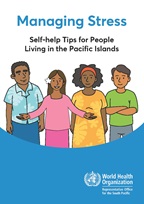Addressing noncommunicable diseases in the Pacific islands
Noncommunicable
diseases (NCDs) including cardiovascular diseases, diabetes, cancer, and
chronic respiratory diseases, represent the single largest cause of premature
mortality in the Pacific Islands. The rise of NCDs in Pacific island countries and areas (PICs) – as
elsewhere – has been driven primarily by four major risk factors: tobacco use,
unhealthy diets, physical inactivity, and the harmful use of alcohol.
Mental health is
a state of mental well-being in which the individual realises his or her own
abilities, can cope with the normal stresses of life, can work productively and
fruitfully and is able to contribute to his or her community. Mental health
conditions and disability remain a significant burden in the Pacific Islands,
with large gaps in the availability and uptake of mental health services. The
COVID-19 pandemic has highlighted the importance of good mental health for
all.
Another group of
important causes of death and disability are violence and injury, particularly
gender-based violence, domestic violence and road traffic injuries. The drivers
of these problems are complex, including societal changes and globalisation.
They are also potentially worsened by the impacts of climate change and natural
disasters. In addition, some PICs are facing the challenges
and opportunities of an increasing population of older people, while most other
PICs have a large youthful population that needs to prepare
for the increased burden of NCDs as the population grows older.
These risk factors and conditions impact the lives of individuals, their families and communities, and burden health systems. Since first committing to the Healthy Islands vision in 1995, Pacific Island governments have been working hard to tackle the predominant and growing burden of NCDs, with the support of their partners, including WHO.
WHO is working closely with Member States to:
- Make healthier foods more affordable, accessible and available;
- Identify and leverage opportunities for physical activity that fit with people’s;
- Adapt and build cost-effective NCD interventions into primary health care through the Package of Essential NCD interventions, including cancer early detection and screening;
- Adhere to the WHO-FCTC and decrease tobacco industry interference towards the goal of Tobacco Free Pacific 2025;
- Improve mental health care through strengthening governance and legislation, and building up human resources to develop quality people-focused care.
- Promote mental health into communities and settings of daily life, to increase protective actors and reduce risk factors for mental health conditions.
- Adapt mental health care to reach the unreached using innovations and grounds up approaches to meet the needs of communities.
- Reduce the harmful use of alcohol;
- Strengthen multi-sectoral planning and governance for NCD prevention and management;
- Conduct monitoring and surveillance of the burden of NCDs and their risk factors to inform decision-making;
- Understand more about healthy ageing, strengthening policies within and beyond the health sector to respond to the needs of older people;
- Increase access to community-based rehabilitation; and
- Reduce the problem of violence and injury.








/eat-a-more-plant-based-diet.tmb-549v.jpg?Culture=en&sfvrsn=71a4c90c_1)
/ride-a-bike.tmb-549v.jpg?Culture=en&sfvrsn=911cf909_1)
/take-the-stairs.tmb-549v.jpg?Culture=en&sfvrsn=b5330841_1)